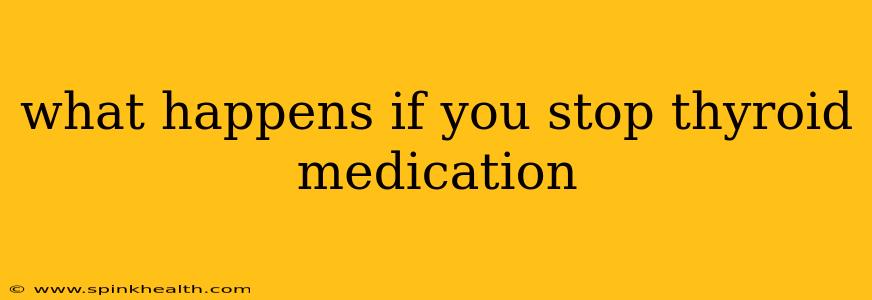Stopping thyroid medication abruptly can feel like stepping off a carefully balanced tightrope. For those living with hypothyroidism, a condition where the thyroid gland doesn't produce enough thyroid hormone, medication is often the key to maintaining a healthy balance. But what happens when that key is removed? The consequences can range from mildly inconvenient to seriously life-threatening, depending on various factors. This isn't a casual decision; it requires careful collaboration with your doctor.
What is Hypothyroidism, and Why is Medication Necessary?
Before we dive into the repercussions of stopping thyroid medication, let's establish the context. Hypothyroidism is a condition where your thyroid gland, a butterfly-shaped gland in your neck, doesn't produce enough thyroid hormones—thyroxine (T4) and triiodothyronine (T3)—vital for regulating metabolism. These hormones influence almost every cell and organ in your body, affecting everything from your heart rate and body temperature to your mood and energy levels.
Without adequate thyroid hormone replacement, your body's metabolic processes slow down. This can lead to a wide range of symptoms, including fatigue, weight gain, constipation, dry skin, and depression. Medication, typically in the form of synthetic thyroxine (levothyroxine), replaces the missing hormones and helps restore the body's balance.
What Happens If I Stop Taking My Thyroid Medication?
Stopping thyroid medication abruptly can lead to a rapid worsening of hypothyroidism symptoms, a condition known as myxedema. Imagine a slow-motion movie suddenly hitting rewind at high speed. The symptoms you were managing with medication will return—and potentially worsen significantly.
This isn't just about feeling tired or gaining weight. A severe lack of thyroid hormone can cause:
- Myxedema Coma: This is a life-threatening medical emergency characterized by severely decreased levels of consciousness, hypothermia, and respiratory depression. It requires immediate medical attention.
- Cardiovascular Issues: A drop in thyroid hormone can affect your heart rate and rhythm, potentially leading to heart problems.
- Severe Constipation and Swelling: The slowing of your digestive system can become severe, leading to significant discomfort and potentially dangerous complications.
- Cognitive Impairment: Severe hypothyroidism can affect brain function, leading to confusion, memory problems, and difficulty concentrating.
- Increased Sensitivity to Cold: Your body's ability to regulate temperature plummets, making you extremely sensitive to cold.
How Quickly Do Symptoms Return After Stopping Thyroid Medication?
The speed at which symptoms return depends on several factors, including:
- The Severity of Your Hypothyroidism: Individuals with more severe hypothyroidism might experience a more rapid and pronounced return of symptoms.
- The Dosage of Medication: Higher dosages may lead to a more gradual return of symptoms if discontinued.
- Individual Metabolism: Individual metabolic rates vary, influencing how quickly the body responds to the absence of thyroid hormone.
Can You Gradually Reduce Your Thyroid Medication Dosage?
Absolutely not without consulting your doctor. While your doctor might adjust your dosage over time, this is done under their close supervision and based on regular blood tests to monitor your hormone levels. Sudden cessation can lead to serious complications. A gradual decrease, if deemed necessary, requires careful monitoring to prevent a sharp decline in thyroid hormone levels.
What Are the Long-Term Effects of Stopping Thyroid Medication?
The long-term effects of abruptly stopping thyroid medication can be significant and long-lasting. It can contribute to the worsening of existing conditions, and might lead to irreversible damage in certain organs. The severity depends on how long the medication is discontinued and the individual's overall health.
What Should I Do If I'm Thinking About Stopping My Thyroid Medication?
Never stop your thyroid medication without first discussing it with your doctor. If you have concerns about your medication, they can address them and help you develop a safe and effective plan. Remember, your health is paramount. A well-managed hypothyroidism can allow you to lead a full and active life. Ignoring this vital treatment could lead to serious repercussions. Your doctor is your best ally in this journey.

